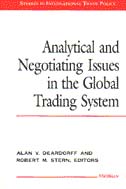
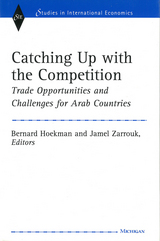
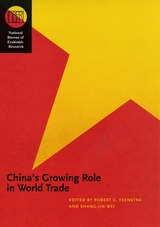
Bringing together an expert group of contributors, China's Growing Role in World Trade undertakes an empirical investigation of the effects of China's new status. The essays collected here provide detailed analyses of the microstructure of trade, the macroeconomic implications, sector-level issues, and foreign direct investment. This volume's careful examination of micro data in light of established economic theories clarifies a number of misconceptions, disproves some conventional wisdom, and documents data patterns that enhance our understanding of China's trade and what it may mean to the rest of the world.
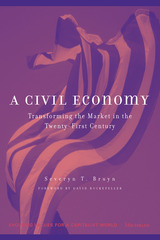
Severyn T. Bruyn describes how people in three sectors--government, business, and the Third Sector (nonprofits and civil groups)--can develop an accountable, self-regulating, profitable, humane, and competitive system of markets that could be described as a civil economy. He examines how government officials can organize markets to reduce government costs; how local leaders deal with global corporations that would unfairly exploit their community resources; and how employees can become coparticipants in the development of human values in markets.
A Civil Economy is oriented to interdiciplinary studies of the economy, assisting scholars in diverse fields, such as business management, sociology, political science, and economics, in developing a common language to examine civic problems in the marketplace.
As an undergraduate text, it evokes a mode of thought about the development of a self-accountable system of markets. Students learn to understand how the market economy becomes socially accountable and self-reliant, while remaining productive, competitive, and profitable.
Sveryn T. Bruyn is Professor of Sociology, Boston College.
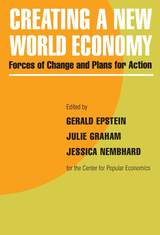
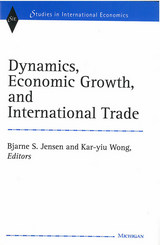
The work collected here serves to bridge the "old" growth theory and "new" growth theory; merge growth and trade theory; suggest new analysis and techniques of economic growth; and provide analysis of new issues related to growth and trade. The first chapter surveys endogenous growth and international trade and critically reviews the endogenous growth theory with a unified framework, covering the work on both closed and open economies. Three chapters examine the dynamics of some basic trade models; two chapters focus on growth and trade with endogenous accumulation of human and public capital; two chapters on economic growth, technological progress, and international trade; and two chapters on growth and international factor movements.
Contributors include Eric W. Bond, Theo S. Eicher, Rolf Färe, Oded Galor, Shawna Grosskopf, Bjarne S. Jensen, Pantelis Kalaitzidakis, Shoukang Lin, Ngo Van Long, Kazuo Nishimura, Koji Shimomura, Kathleen Trask, Stephen J. Turnovsky, Pham Hoang Van, Henry Wan, Jr., Chunyan Wang, and Kar-yiu Wong.
Bjarne S. Jensen is Associate Professor of Economics, Copenhagen Business School. Kar-yiu Wong is Professor of Economics, University of Washington, Seattle.
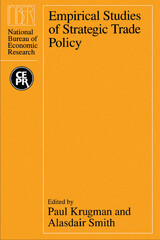
The nine papers cover the U.S. and European auto industries, the U.S. steel industry, the commercial aircraft industry, airline deregulation in Scandinavia, and labor and industrial policy in Korea and Taiwan. The authors refine the basic techniques for measuring policy effectiveness, extend them to encompass industry dynamics, and test the implications of new trade models.
International economists and trade experts in government and business will find important new insights into the role of strategic trade policy in international competitiveness.

"Globalization" is here. Signified by an increasingly close economic interconnection that has led to profound political and social change around the world, the process seems irreversible. In this book, however, Harold James provides a sobering historical perspective, exploring the circumstances in which the globally integrated world of an earlier era broke down under the pressure of unexpected events.
James examines one of the great historical nightmares of the twentieth century: the collapse of globalism in the Great Depression. Analyzing this collapse in terms of three main components of global economics--capital flows, trade, and international migration--James argues that it was not simply a consequence of the strains of World War I but resulted from the interplay of resentments against all these elements of mobility, as well as from the policies and institutions designed to assuage the threats of globalism. Could it happen again? There are significant parallels today: highly integrated systems are inherently vulnerable to collapse, and world financial markets are vulnerable and unstable. While James does not foresee another Great Depression, his book provides a cautionary tale in which institutions meant to save the world from the consequences of globalization--think WTO and IMF, in our own time--ended by destroying both prosperity and peace.

Fair Trade is now mainstream, with large companies like Cadbury's and supermarkets such as Sainsbury's producing and stocking many Fair Trade products. The authors of this collection, many of whom were responsible for the initial success of Fair Trade, emphasise the importance of ensuring that farmers and other producers remain the main beneficiaries. Punchy chapters, illustrated with many real-world examples, cover all the important issues including the tensions between large and small operators, the impact of recession, environmental policy and the danger of large operators embracing Fair Trade more in word than in practice.
Written by the leading lights of the Fair Trade movement, including Harriet Lamb (Executive Director of the Fairtrade Foundation) and Bruce Crowther (Establisher of the world's first Fair Trade Town) this book will inspire activists and consumers to keep making the right choices.

This critical account of the fair trade movement explores the vast gap between the rhetoric of fair trade and its practical results for poor countries, particularly those of Africa. In the Global North, fair trade often is described as a revolutionary tool for transforming the lives of millions across the globe. The growth in sales for fair trade products has been dramatic in recent years, but most of the benefit has accrued to the already wealthy merchandisers at the top of the value chain rather than to the poor producers at the bottom.
Ndongo Sylla has worked for Fairtrade International and offers an insider’s view of how fair trade improves—or doesn’t—the lot of the world’s poorest. His methodological framework first describes the hypotheses on which the fair trade movement is grounded before going on to examine critically the claims made by its proponents. By distinguishing local impact from global impact, Sylla exposes the inequity built into the system and the resulting misallocation of the fair trade premium paid by consumers. The Fair Trade Scandal is an empirically based critique of both fair trade and traditional free trade; it is the more important for exploring the problems of both from the perspective of the peoples of the Global South, the ostensible beneficiaries of the fair trade system.
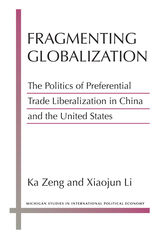
Fragmenting Globalization uses multiple methods, including time series, cross-sectional analysis of the pattern of Preferential Trade Alliance formation by existing World Trade Organization members, a firm-level survey, and case studies of the pattern of corporate support for regional trade liberalization in both China and the United States. Zeng and Li show that the growing fragmentation of global production, trade, and investment is altering trade policy away from the traditional divide between export-oriented and import-competing industries.

The first essay assesses U.S. interests in economic globalization, the second examines recent steps toward free trade at the multilateral and regional levels, and the next three offer an in-depth critique of U.S. regional free trade objectives in the Americas, across the Pacific, and possibly with Europe. The final essay presents a multilateral/regional synthesis for going from here to free trade over the coming decade.
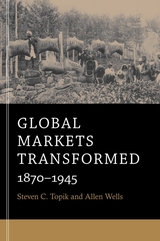
Offering a fresh look at trade during the second industrial revolution, Global Markets Transformed describes a world of commodities on the move—wheat and rice, coffee and tobacco, oil and rubber, all jostling around the planet through a matrix of producers, processors, transporters, and buyers. Steven C. Topik and Allen Wells discuss how innovations in industrial and agricultural production, transportation, commerce, and finance transformed the world economy from 1870 to 1945.
Topik and Wells trace the evolution of global chains of commodities, from basic food staples and stimulants to strategically important industrial materials, that linked the agricultural and mineral-producing areas of Latin America, Asia, and Africa to European and North American consumers and industrialists. People living a great distance apart became economically intertwined as never before. Yet laborers and consumers at opposite ends of commodity chains remained largely invisible to one another. Affluent American automobile owners who were creating the skyrocketing demand for tires, for example, knew almost nothing about poor Brazilian tappers who sweated in the Amazon to supply the rubber necessary for their vehicles.
As commodity chains stretched out around the world, more goods were bound up in markets that benefited some countries more than others. Global Markets Transformed highlights the lessons and legacy of the early years of globalization—when the world’s population doubled, trade quadrupled, industrial output multiplied fivefold, and the gap between rich and poor regions grew ever wider.
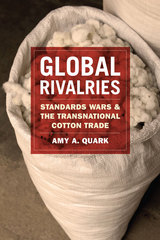
Nowhere is the conflict over rule setting more evident than in the simmering “standards wars” over the rules that define quality and enable the adjudication of disputes. In Global Rivalries, Amy A. Quark explores the questions of how rules are made, who makes them, and how they are enforced, using the lens of cotton—a simple commodity that has become a poignant symbol of both the crisis of Western rule making power and the potential for powerful new rivals to supplant it. Quark traces the strategies for influencing rule making processes employed not only by national governments but also by transnational corporations, fiber scientists, and trade associations from around the globe. Quark analyzes the efficacy of their approaches and the implications for more marginal actors in the cotton trade, including producers in West Africa.

This book will appeal to a broad audience of historians and students of American visual art, as well as scholars and students of fine and decorative arts.
Hardcover is un-jacketed.
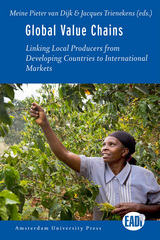
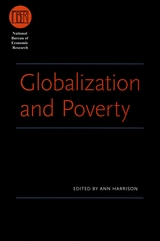
Over the past two decades, the percentage of the world’s population living on less than a dollar a day has been cut in half. How much of that improvement is because of—or in spite of—globalization? While anti-globalization activists mount loud critiques and the media report breathlessly on globalization’s perils and promises, economists have largely remained silent, in part because of an entrenched institutional divide between those who study poverty and those who study trade and finance.
Globalization and Poverty bridges that gap, bringing together experts on both international trade and poverty to provide a detailed view of the effects of globalization on the poor in developing nations, answering such questions as: Do lower import tariffs improve the lives of the poor? Has increased financial integration led to more or less poverty? How have the poor fared during various currency crises? Does food aid hurt or help the poor?
Poverty, the contributors show here, has been used as a popular and convenient catchphrase by parties on both sides of the globalization debate to further their respective arguments. Globalization and Poverty provides the more nuanced understanding necessary to move that debate beyond the slogans.
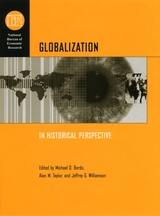
This volume collects eleven papers doing exactly that and more. The first group of essays explores how the process of globalization can be measured in terms of the long-term integration of different markets-from the markets for goods and commodities to those for labor and capital, and from the sixteenth century to the present. The second set of contributions places this knowledge in a wider context, examining some of the trends and questions that have emerged as markets converge and diverge: the roles of technology and geography are both considered, along with the controversial issues of globalization's effects on inequality and social justice and the roles of political institutions in responding to them. The final group of essays addresses the international financial systems that play such a large part in guiding the process of globalization, considering the influence of exchange rate regimes, financial development, financial crises, and the architecture of the international financial system itself.
This volume reveals a much larger picture of the process of globalization, one that stretches from the establishment of a global economic system during the nineteenth century through the disruptions of two world wars and the Great Depression into the present day. The keen analysis, insight, and wisdom in this volume will have something to offer a wide range of readers interested in this important issue.

Environmental groups for the first time formalized their role in shaping U.S. and international trade policy during their involvement in NAFTA negotiations. John J. Audley identifies the political forces responsible for forging this new intersection of trade and environment policy during NAFTA negotiations, analyzes the achievements of the environmentalists, and explores their prospects for influencing future trade policy.
The need to reconcile the conflicting paradigms of economic expansion through free trade and that of limited sustainable development played a significant part in the political debate. Reluctant to acknowledge any relationship between these two principles, traditional trade policy actors were forced to include environmental interest groups in negotiations when the latter seriously threatened the treaty by aligning themselves with other anti-NAFTA interest groups, particularly labor. Other environmental groups worked with trade advocates to secure compromises in the agreement. The final bill included unprecedented environmental provisions, but not without serious infighting within the environmentalist community.
Drawing on his access to private as well as public documents exchanged among participants, Audley explores the interactions among the political actors. He explains how political compromises between environmental groups and trade policy elites came about, focusing in particular on the roles played by eleven national environmental organizations. In identifying their accomplishments, he concludes that although the environmentalists won some procedural changes, they failed to modify the norm of unfettered growth as the guiding principle of U.S. trade policy.
The first book to probe the role that environmental politics play in trade policy, this volume offers new insights into the political effectiveness of environmental organizations.
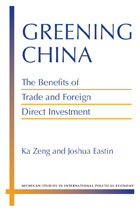
“The authors make some very critical interventions in this debate and scholars engaged in the environmental ‘pollution haven’ and ‘race to the bottom’ debates will need to take the arguments made here seriously, re-evaluating their own preferred theories to respond to the insightful theorizing and empirically rigorous testing that Zeng and Eastin present in the book.”
—Ronald Mitchell, University of Oregon
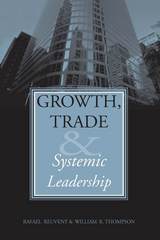
Rafael Reuveny is Associate Professor in the School of Public and Environmental Affairs at Indiana University. William R. Thompson is Professor of Political Science at Indiana University.
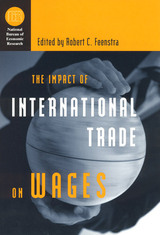
This collection brings together innovative new ideas and data sources in order to provide more satisfying alternatives to the trade versus technology debate and to assess directly the specific impact of international trade on U.S. wages. This timely volume offers a thorough appraisal of the wage distribution predicament, examining the continued effects of technology and globalization on the labor market.
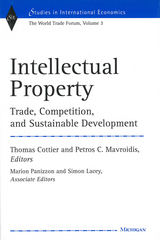
Largely a victory for OECD countries, the present state of intellectual property rights has important implications for developing countries. The incorporation of intellectual property rights into the WTO system will eventually change the relationship of trade, competition, and intellectual property. It will equally have to assist in providing equitable sharing of benefits in the use of plant genetic resources. All of these issues are essential for the revision of exclusions from patenting in TRIPs. This volume offers insights into how this difficult task could and should be approached in a balanced manner and will be essential reading for economists and trade and intellectual property lawyers interested in the subject. Moreover, the volume will be relevant to agricultural economists as it addresses complex problems in the interstices of trade, intellectual property, plant genetic resources, and sustainable development.
Thomas Cottier is Professor of European and International Economic Law, University of Bern, and Managing Director, World Trade Institute, University of Bern.
Petros C. Mavroidis is Professor of Law, University of Neuchâtel. He formerly worked in the Legal Affairs Division of the World Trade Organization.
Marion Panizzon is Research Fellow, University of Bern.
Simon Lacey is Research Fellow, University of Bern.

Tracing the fundamental changes of the last forty years in international development policies toward the Third World, Dell details the transformation from a policy of collective responsibility on the part of the international community to the current status, in which the commitment of governments of industrial countries to Third World development is greatly diluted. He examines the growing conflicts in world trade and analyzes the failure of the international economic community to develop a long-run strategy for dealing with the world debt crisis.
Other topics addressed include the future of the international monetary system, the viability of small countries, strategies for development of basic needs, and the prospects for foreign private investment.

The missing link between the international trade regime and human rights has become one of the key concerns of critics of the WTO. The World Trade Forum 2001 at the World Trade Institute in Berne provided a unique framework for considering the manifold issues relevant to this topic. This book goes beyond listing the different arguments in favor of or against globalization and offers recommendations to the international community for possible reforms so as to better account for the human rights interests affected by the process of globalization.
Frederick M. Abbott is the Edward Ball Eminent Scholar Professor of International Law at Florida State University College of Law. He is the editor of China in the World Trading System: Defining the Principles of Engagement (1998) and author of The International Intellectual Property System: Commentary and Materials (with Thomas Cottier and Francis Gurry, 1999).
Christine Breining-Kaufmann is Professor of Law at the University of Zurich and Senior Research Fellow as well as a member of the Board of the World Trade Institute in Berne. Her publications include Hunger als Rechtsproblem: Völkerrechtliche Aspekte eines Rechtes auf Nahrung (1991) and Globalization and Labour Rights: The Conflicting Relationship between Core Labour Rights and International Economic Institutions (2006).
Thomas Cottier is Managing Director of the World Trade Institute and Professor of Law at the University of Berne. He has co-edited the previous four volumes of the World Trade Forum series.
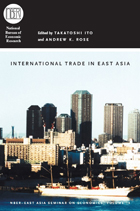
Comprised of twelve fascinating studies, International Trade in East Asia highlights many of the trading practices between countries within the region as well as outside of it. The contributors bring into focus some of the region's endemic and external barriers to international trade and discuss strategies for improving productivity and fostering trade relationships. Studies on some of the factors that drive exports, the influence of research and development, the effects of foreign investment, and the ramifications of different types of protectionism will particularly resonate with the financial and economic communities who are trying to keep pace with this dramatically altered landscape.
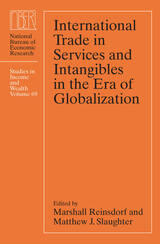
Quantitative measures of international exchange have historically focused on trade in tangible products or capital. However, services have recently become a larger portion of developed economies and international trade, and will only increase in the future. In International Trade in Services and Intangibles in the Era of Globalization, Marshall Reinsdorf and Matthew J. Slaughter examine new and emerging patterns of trade, especially the growing importance of transactions involving services or intangible assets such as intellectual property.
A distinguished team of contributors analyzes the challenges involved in measuring trade in intangibles, the comparative advantages enjoyed by United States service industries, and the heightened international competition for jobs, capital investment, economic growth, and tax revenue that results from trade in services. This comprehensive volume will be necessary reading for scholars seeking to understand the rapidly changing global economy.
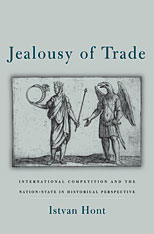
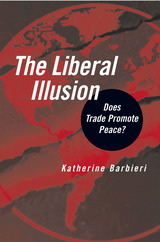
--Nils Petter Gleditsch, Journal of Peace Research
"Barbieri builds on a solid foundation of work on trade and conflict and specifies the conditions under which trade reduces and increases conflict. . . . The bottom line is that this is an important book in the study of trade and conflict because of its comprehensive approach."
--Kathy L. Powers, Perspectives on Politics
"Barbieri's analysis reveals the fundamental and intellectual weaknesses of the various arguments on this topic. [A] solid and timely contribution to the literature"
--Choice
The Liberal Illusion sheds light on an increasingly important question in international relations scholarship and the domain of policy making-whether international trade promotes peace. By examining a broad range of theories about trade's impact on interstate relations and undertaking a set of empirical analyses of the trade-conflict puzzle, Katherine Barbieri provides a comprehensive assessment of the liberal view that trade promotes peace. Barbieri's stunning conclusions depart from conventional wisdom in international relations. Consequently, The Liberal Illusion serves as an important counterargument and a warning call to policymakers who rely upon trade-based strategies to promote peace, strategies that appear to offer little hope of achieving their goals.

In our increasingly globalized world, U.S. trade policy stands at the intersection of foreign and domestic affairs. This book explains trade policy in terms of domestic politics, presenting a concise account of its origins and political significance.
Although trade policy is a component of foreign policy, Philip A. Mundo explains how it is rooted in the domestic policy process and carries with it enormous implications for domestic affairs. He reviews the growing importance of trade policy since World War II — particularly over the past twenty years — and shows how recent policies like NAFTA are shaped by the domestic agenda.
Mundo explains trade policy as the product of a three-stage process comprising agenda setting, program adoption, and implementation. He reviews this process in terms of the ideas that inform trade policy, the interests that seek to influence it, and the institutions that shape it. He also addresses the importance of specific measures, such as administrative relief and trade sanctions.
This book distills the essence of the trade policy process into a concise, innovative framework accessible to students and general readers. With the growing importance of trade policy, it makes explicit many of the subtleties surrounding policymaking while fully explicating the legal and international context in which trade operates.
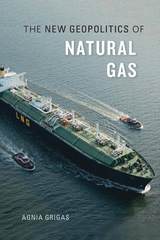
We are in the midst of an energy revolution, led by the United States. As the world’s greatest producer of natural gas moves aggressively to expand its exports of liquefied natural gas (LNG), America stands poised to become an energy superpower—an unanticipated development with far-reaching implications for the international order. Agnia Grigas drills deep into today’s gas markets to uncover the forces and trends transforming the geopolitics of gas.
The boom in shale gas production in the United States, the growth of global LNG trade, and the buildup of gas transport infrastructure worldwide have so transformed the traditional markets that natural gas appears to be on the verge of becoming a true global commodity. Traditional suppliers like Russia, whose energy-poor neighbors were dependent upon its gas exports and pipelines, are feeling the foundations of the old order shifting beneath their feet. Grigas examines how this new reality is rewriting the conventional rules of intercontinental gas trade and realigning strategic relations among the United States, the European Union, Russia, China, and beyond.
In the near term, Moscow’s political influence will erode as the Russian gas giant Gazprom loses share in its traditional markets while its efforts to pivot eastward to meet China’s voracious energy needs will largely depend on Beijing’s terms. In this new geopolitics of gas, the United States will enjoy opportunities but also face challenges in leveraging its newfound energy clout to reshape relations with both European states and rising Asian powers.
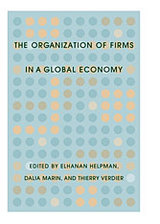
The Organization of Firms in a Global Economy presents a new research program that is transforming the study of international trade. Driven by the availability of new micro data sets and innovative theoretical models, it focuses on the level of firms, products, and stages of production rather than on countries and industries. It addresses such questions as why only a small proportion of firms in a given industry export and why an even smaller proportion invest abroad; why exporters tend to be more productive than nonexporters; why almost one-third of international trade takes place between units of the same firm and why as much as two-thirds involves multinational firms as exporter, importer, or both; and why international trade may have been the most important driver of organizational changes in the corporation that have been taking place in the last decade.
Until a few years ago, models of international trade did not recognize the heterogeneity of firms and exporters, and could not provide good explanations of international production networks. Now such models exist and are explored in this volume.

Providing an important and original perspective for understanding both the development process and policies aimed at raising the standard of living in poorer nations, Perspectives on Trade and Development gathers sixteen of Anne O. Krueger's most important essays on international trade and development economics. Her essays discuss the relationships between trade strategies and development; the links between factor endowments, developing countries' policies, and trade strategies in terms of their growth; the role of economic policy in development; and the international economic environment in which development efforts are taking place. Her analyses are extended to trade and development policies generally, and account for a substantial part of the residue unexplained by past theories. This insightful contribution by an influential scholar will be essential reading for all scholars of trade and development.
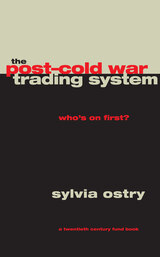
With keen historical awareness, Ostry examines the role of key economic power brokers, particularly the United States, in the reconstruction and reconfiguration of an international economy after World War II. She argues that U.S. policy efforts were so successful that they led to an unprecedented renewal of economic growth, living standards, and education levels in postwar Europe and Japan. Ironically, those same policy successes unintentionally fostered the relative decline of U.S. dominance on the world trade scene as the reduction of trade and investment barriers prompted friction and conflict between different kinds of capitalist systems.
Identifying the historical and legal issues key to postwar trade policy, Ostry has commandingly charted our economic course through the last half of this century and, perhaps, into the next.
"Sylvia Ostry knows this subject as few others do, both as a scholar of international trade issues and a major player in the ongoing negotiations that have created the rules of the trade game. The Post-Cold War Trading System is a fine summary of where we've been and where we ought to be going."—Peter Passell, economic scene columnist for The New York Times
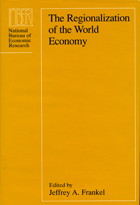
Including both empirical and theoretical studies, this volume addresses several important questions: Why do countries adopt FTAs and other regional trading arrangements? To what extent have existing regional arrangements actually affected patterns of trade? What are the welfare effects of such arrangements? Several chapters explore the economic effects of regional arrangements on patterns of trade, either on price differentials or via the gravity model on bilateral trade flows. In addition, this book examines the theoretical foundation of the gravity model. Making extensive use of the gravity model of bilateral trade, several chapters explore the economic effects of regional arrangements. In addition, this book examines the theoretical foundation of the gravity model.
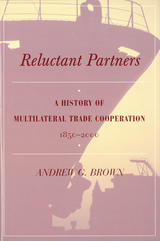
This is a nontechnical book for those curious about the possibilities for cooperation among states and should be of interest to both the nonspecialist and the specialist. It draws on more than one discipline to interpret the events, lying in the triangle bounded by political science, economics, and history.
Andrew G. Brown is a former Director of the General Analysis and Policies Division for the United Nations, New York.
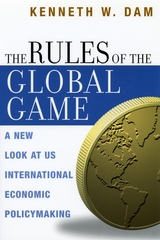
In The Rules of the Global Game, Dam first lays out what US international economic policies are and compares them to what they should be based on how they affect US per capita income. With this foundation in place, Dam then develops and applies principles for elucidating the major components of economic policy, such as foreign trade and investment, international monetary and financial systems, and current controversial issues, including intellectual property and immigration. Underlying his explanations is a belief in the importance of worldwide free trade and open markets as well as a crucial understanding of the political forces that shape decision making. Because economic policy is not created in a political vacuum, Dam argues, sound policymaking requires an understanding of "statecraft"-the creation and use of institutions that channel the efforts of interest groups and political forces in directions that encourage good economic outcomes.
Dam's vast experience with the politics and practicalities of economic policy translates into a view of policy that is neither academic nor abstract. Rather, Dam shows us how policy is actually made, who makes it, and why, using examples such as GATT, NAFTA, the US-Japan semiconductor agreement, and the Asian financial crisis. A rare book that can be read with pleasure and profit by layperson and economist alike, The Rules of the Global Game allows readers to understand the policies that shape our economy and our lives.
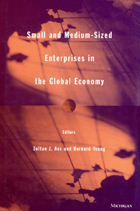
The first part of the volume provides an overview of the phenomenon of globalization, arguing that entrepreneurial discovery and technological change lead to globalization, which in turn leads to further opportunity for entrepreneurial discovery--no less for SMEs than for multinational corporations. In part two, the essays examine the role of SMEs in the global economy and why they are thriving. Part three reviews the roles of SMEs and innovators and examines their roles in direct foreign investment. Part four explores the role of technological diversity and knowledge spillovers as a way to explain the superior innovative performance of SMEs. Part five looks at the role of SMEs in technology transfer. Finally, part six examines the theoretical and policy implications of the international activities of SMEs, suggesting that policies should aim to reduce the costs in international expansion for SMEs.
This volume will provide the foundation for further study in SMEs and globalization. It will appeal to scholars and students in both international business and economics.
Zoltan J. Acs is Professor of Economics and Finance, University of Baltimore. Bernard Yin Yeung is Professor of International Business, University of Michigan.
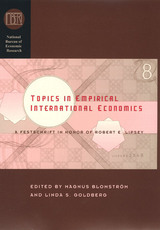


Preeg places the Uruguay Round in the broader context of global politics and economics, showing how changes in the world order—from the collapse of communism to dramatic economic reforms in developing countries—influenced both the topics of negotiations and their outcome. He then assesses the final GATT agreement as a case study in international negotiations and evaluates its probable effects on income and trade.
Finally, Preeg looks to the short- and long-term issues confronting future trade-policy negotiators. He shows that the international trade agenda will consist of three evolving types of agreement—further multilateral commitments, regional free-trade agreements, and selective bilateral accords. Going to the heart of current debates on the "new world order," an important final chapter evaluates the political and economic relationships that will result from the international trading system.
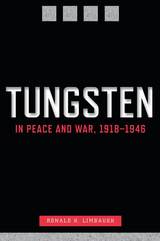
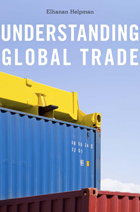
Global trade is of vital interest to citizens as well as policymakers, yet it is widely misunderstood. This compact exposition of the market forces underlying international commerce addresses both of these concerned groups, as well as the needs of students and scholars. Although it contains no equations, it is almost mathematical in its elegance, precision, and power of expression.
Understanding Global Trade provides a thorough explanation of what shapes the international organization of production and distribution and the resulting trade flows. It reviews the evolution of knowledge in this field from Adam Smith to today as a process of theoretical modeling, accumulation of new empirical data, and then revision of analytical frameworks in response to evidence and changing circumstances. It explains the sources of comparative advantage and how they lead countries to specialize in making products which they then sell to other countries. While foreign trade contributes to the overall welfare of a nation, it also creates winners and losers, and Helpman describes mechanisms through which trade affects a country's income distribution.
The book provides a clear and original account of the revolutions in trade theory of the 1980s and the most recent decade. It shows how scholars shifted the analysis of trade flows from the sectoral level to the business-firm level, to elucidate the growing roles of multinational corporations, offshoring, and outsourcing in the international division of labor. Helpman’s explanation of the latest research findings is essential for an understanding of world affairs.

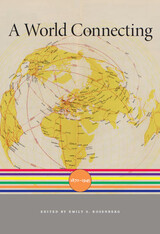
Between 1870 and 1945, advances in communication and transportation simultaneously expanded and shrank the world. New technologies erased distance and accelerated the global exchange of people, products, and ideas on an unprecedented scale. A World Connecting focuses on an era when growing global interconnectedness inspired new ambitions but also stoked anxieties and rivalries that would erupt in two world wars—the most destructive conflicts in human history.
In five interpretive essays, distinguished historians Emily S. Rosenberg, Charles S. Maier, Tony Ballantyne, Antoinette Burton, Dirk Hoerder, Steven C. Topik, and Allen Wells illuminate the tensions that emerged from intensifying interconnectedness and attempts to control and shape the effects of sweeping change. Each essay provides an overview of a particular theme: modern state-building; imperial encounters; migration; commodity chains; and transnational social and cultural networks. With the emergence of modern statehood and the fluctuating fate of empires came efforts to define and police territorial borders. As people, products, capital, technologies, and affiliations flowed across uneasily bounded spaces, the world both came together and fell apart in unexpected, often horrifying, and sometimes liberating ways.
A World Connecting goes beyond nations, empires, and world wars to capture the era’s defining feature: the profound and disruptive shift toward an ever more rapidly integrating world.
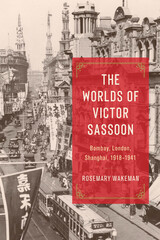
In this book, historian Rosemary Wakeman brings to life the frenzied, crowded streets, markets, ports, and banks of Bombay, London, and Shanghai. In the early twentieth century, these cities were at the forefront of the sweeping changes taking the world by storm as it entered an era of globalized commerce and the unprecedented circulation of goods, people, and ideas. Wakeman explores these cities and the world they helped transform through the life of Victor Sassoon, who in 1924 gained control of his powerful family’s trading and banking empire. She tracks his movements between these three cities as he grows his family’s fortune and transforms its holdings into a global juggernaut. Using his life as its point of entry, The Worlds of Victor Sassoon paints a broad portrait not just of wealth, cosmopolitanism, and leisure but also of the discrimination, exploitation, and violence wreaked by a world increasingly driven by the demands of capital.
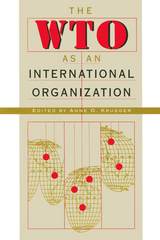
"[T]his book is a tour de force, with consistently fine papers by leading experts, and it is worthy of any bookshelf." —Joel P. Trachtman, American Journal of International Law
"This latest conference volume from the National Bureau of Economic Research is likely to be the definitive reference work on the WTO for years to come. . . . Specialists and non-specialists alike will gain a great deal from a careful reading of this impressive volume." —John Ravenhill, Australian Journal of Political Science
"For anyone who is interested in the further development of the rule system for the world economy, this book is a must." —Horst Siebert, Review of World Economics
READERS
Browse our collection.
PUBLISHERS
See BiblioVault's publisher services.
STUDENT SERVICES
Files for college accessibility offices.
UChicago Accessibility Resources
home | accessibility | search | about | contact us
BiblioVault ® 2001 - 2024
The University of Chicago Press









